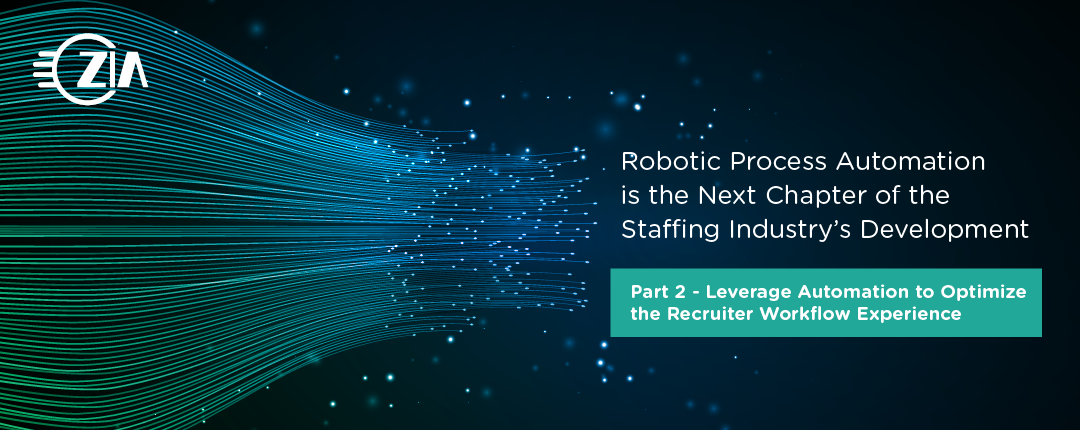In the first article of this series, I introduced the concept of how robotic process automation (RPA) technology is going to be foundational for growth in the staffing industry, specifically as it relates to automating the majority of the sourcing process. The overall message is that automation allows recruiters to spend more time consulting with prospective candidates, instead of doing the repetitive output tasks needed to achieve productivity targets. While the primary purpose of investing in RPA technology is to increase the company-wide ratio of job placements per recruiter, it will ultimately elevate the profession by reducing aspects of the job that churn recruiters in and out of the business. Creating a better experience for recruiters increases the likelihood that top industry talent stays engaged. Ultimately this will trickle down to a better candidate experience, which will deliver more value to the customers that hire agencies.
This article focuses on the steps that proceed sourcing and interviewing a candidate in a typical workflow for a recruiter. Within this, you will see how RPA can improve this experience. To begin, I’ll provide an overview of the manual and repeatable processes recruiters complete on a day-to-day basis. Then, I’ll share how leveraging automation unlocks immense growth potential for the industry.
During my career, I have worked for three different recruiting agencies. One of the common threads in the industry is that being a recruiter is essentially herding cats. On a weekly basis, a typical recruiter sources hundreds of candidates, interviews 15-20 of those, schedules multiple client interviews that require prepping and debriefing,completing reference checks, and overseeing candidates throughout the onboarding process. In addition to this never ending process of generating new business, recruiters have to manage existing employees on assignment. They handle issues like time cards, job performance, and other things that come up from week-to-week. If you’re not already feeling empathetic for the stress recruiters deal with, additional factors like the immense pressure to hit daily, weekly and monthly production targets also exist. It would be easier to handle this if they did not also have hundreds of manual tasks to complete as part of their role. This scenario creates a perfect storm for recruiters to experience burnout. The wreckage is a less ideal candidate experience. The future of work moving to the gig economy also complicates things. The gig economy, also called the sharing economy or access economy, describes how people can earn an income by providing on-demand work, services, or goods. This is usually done through a digital platform, like a website or app. Companies are going to continue to use flexible employment models to navigate the uncertain economic times. This makes understanding and applying automation even more important to help tackle these challenges.
The staffing industry is a natural fit for RPA technology due to it having many manual/repeatable processes as part of the standard operation procedure industrywide. Rather than rely on recruiters to manage the manual workflows explained above, the RPA could assist with things like coordinating interviews, sending essential information for interview preparation, submitting resumes to clients and initiating onboarding paperwork. Success needs to focus on how we increase the time that a recruiting team spends providing value to candidates and customers, while incrementally automating the tasks that support this goal.
Start with small wins and take an opportunity to earn your organization’s support by showing the value. This creates a positive culture change within the organization and drastically affects their ability to increase market share, compared to companies that do not embrace automation. In terms of the industry, we expect to see companies that embrace RPA have higher submittal to recruiter ratios, and show increased monthly job placements per recruiter. This allows companies to scale at a rate that propels them to change the game in their respective markets from a competitive standpoint.
Beyond RPA, Zia Consulting can help you build even more strategic technology portfolios that deliver enterprise automation (EA) or hyperautomation. Gartner’s 2022 report shared that this is the wave of the future. Zia Consulting’s deep expertise in RPA and converting unstructured content into structured data makes them highly focused and uniquely positioned to eventually enable the full automation of core back end processes.
As a staffing industry veteran, I welcome the opportunity to help guide you through this process. I spent close to a decade overseeing multiple sales, delivery, and operations teams across a variety of markets. I’d like to leverage this experience to work with you to examine how your business operates and start shifting your mindset to Automation as a core strategy for your business. If you are just beginning to explore your options, I would love to have an initial conversation. Reach out if you are already in the process of automating your agency, or simply just exploring what’s possible. We can discuss how Zia Consulting’s expertise with Hyperautomation and RPA can assist you on your journey. I look forward to hearing from you!

ABOUT THE AUTHOR
Matt Vanore, Enterprise Sales Director – Southeast
Matt has 10+ years of experience as a consultative sales professional primarily in the IT services industry. In past roles, Matt has led both Sales and Delivery teams to service fortune 500 clients in various industries such as Consumer Packaged Goods, Manufacturing, Hospitality, Manufacturing, Information Technology, Entertainment and Financial Services. Matt has a Finance degree and began his career as a group sales representative in the Insurance industry. Outside of work, Matt enjoys spending time with his family, playing poker, reading, and coaching youth sports.

